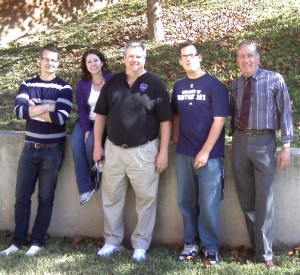On Thursday, October 7, after a 2-hour morning drive from Lexington, VA, I arrived at Longwood University in Farmville, VA and met with Chris Thomas, the percussion specialist on the faculty, who organized my visit in coordination with Lauren Weiss’s Percussion Events Registry Company with the support of Vic Firth, Inc.
The agenda for my visit was to present two back-to-back “Introduction to West African Drumming” workshops for the percussion students and two World Music classes. The 60-minute workshops focused on a piece called “Agbekor” which comes from the drum and dance music of Ghana.
The presentation was based entirely on my own experiences with NEXUS and Abraham Adzenyah, as well as my having heard other master drummers and ensembles from Ghana at various times. My thinking in presenting an “Introduction” to this music, even though I have never been to Ghana, nor have I ever represented myself as a scholar of west African music, is that I am simply providing a way for workshop participants to have an initial hands-on experience with the music, in order to form a visceral appreciation for it.
Every one of the participants had an opportunity to perform on drums – congas, bongos, and toms – provided by the Longwood University percussion department and by the Just Drums drum shop in Richmond, VA thanks to Chris Thomas. I also provided three Ewe drums from Ghana – a kagan, a totodsi, and a kidi – for demonstration.
The 100 attending participants – percussionists and non-percussionists alike – were introduced to a few fundamental concepts about the music, the instruments, playing techniques, and ensemble practices. The intent of the workshop was to convey lots of information in an atmosphere of fun.
Working on the music with the non-percussionist world music students presented an interesting challenge – one that I had encountered before in previous workshops. Most of those students had never even held drumsticks before, so a few moments were devoted to demonstrating how to hold the sticks, and then to walking around the room to check everyone’s grip. Next I played a few strokes on the kidi – right, left, right, left – and asked everyone to do the same. As I walked around the room again to check each participant’s strokes, I noticed that several students were playing on the rim of their drums. They were apparently so focused on this new experience of holding the sticks that they hadn’t yet realized that they’re supposed to play on the drumhead. As soon as I walked over to one of them and began playing alternating strokes on the drumhead, the student looked up at me, smiled, and began playing on the head too. The point of this little incident for would-be teachers is that a great deal of patience and acceptance is sometimes required.
As the workshop proceeded to focus on learning the separate parts of “Agbekor” – first the gankogui, then the kagan, kidi, sogo, totodsi, and finally the axatse – it was necessary to accept that while about 85% of the class were roughly playing their parts, there were others who were unable to grasp even the most basic rhythms. However, that was still OK. Generally, the parts were being played and the experience was a positive one. At the end of both workshops I asked the students from the world music classes if this playing experience had deepened their understanding of the music of Ghana that they had heard on recordings in their classroom. Both groups responded with a resounding “yes!”

After the workshops Chris Thomas and I went to a nearby restaurant along with a few of Chris’s students to chat over a late lunch. For the percussion students the challenge had been learn their parts aurally, without the aid of printed music. I remembered encountering the same issue in my first experiences with west African music, and I offered the observation that this aural way of relating to the music can, in my view, greatly expand musicianship not only in west African drumming, but also in any genre of music, even in the symphony orchestra.
